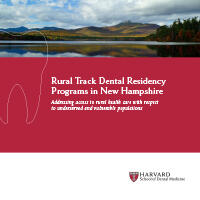The Dental Public Health (DPH) program – Rural Track will address a gap in dental education and in access to care with respect to underserved and vulnerable populations in rural areas of New Hampshire. As a state without a dental school or residency programs, it is critical for New Hampshire to collaborate with Harvard School of Dental Medicine (HSDM) to grow its dental workforce with the advanced skill-set and cultural competency experience required to meet the needs of underserved persons, especially those in rural areas with limited resources. The program will expand the training network of dental professionals in the state, and create opportunities for dentists to become more proficient in providing quality health care focused on population health. Residents will be recruited to work in New Hampshire permanently after completing their formal post-doctoral dental training. The DPH - Rural Track certificate training program is funded by a grant from the Health Resources and Services Administration (HRSA).
Each resident must be a graduate of a CODA-accredited dental school, must be either a U.S. citizen or permanent resident, and must hold or be eligible to obtain a New Hampshire dental license.
Degrees/Certificates Offered
Certificate Only
This two-year program culminates to a certificate in dental public health.
Master of Medical Sciences (MMSc)/Certificate in Dental Public Health
This three-year program culminates to a combined MMSc degree in oral biology, or dental education, and a certificate in dental public health.
Doctor of Medical Sciences (DMSc)/Certificate in Dental Public Health
This four-year program culminates to a combined DMSc degree in oral biology, or dental education, and a certificate in dental public health.
Program Overview
Overall Program Goals and Objectives
- Enhance the residents’ knowledge and competencies in all phases of general dentistry.
- Act as a primary care provider for individuals and groups of patients in a rural setting. This includes: providing emergency and multidisciplinary comprehensive oral health care; providing patient-focused care that is coordinated by the general practitioner; and directing health promotion and disease prevention activities.
- Plan and provide multidisciplinary oral health care for a wide variety of patients including patients with special needs and living in a rural setting.
- Manage the delivery of oral health care by applying concepts of patient and practice management and quality improvement that are responsive to a dynamic health care environment.
- Function effectively and efficiently in multiple rural health care environments within interdisciplinary health care teams.
- Apply scientific principles to learning and oral health care. This includes using critical thinking, evidence or outcomes-based clinical decision-making, tele dentistry and technology-based information retrieval systems.
- Utilize the values of professional ethics, lifelong learning, patient-centered care, adaptability, and acceptance of cultural diversity in professional practice.
- Understand the oral health needs of vulnerable, underserved, and older adult populations living in rural communities, and engage in community service.
Residents
The program will cover HSDM tuition in full and provide a modest stipend.
Accreditation
The program in dental public health is accredited by the Commission on Dental Accreditation. The Commission is a specialized accrediting body recognized by the United States Department of Education. For more information, please visit the Commission on Dental Accreditation website.
Applicant Information
- Master of Public Health Degree or its equivalent preferred
Contact Us
-
Application questions
Email age_admissions@hsdm.harvard.edu. -
Program-specific questions
Email DPH@hsdm.harvard.edu.
_____________________________________________________________
Please visit AGE Admissions for application requirements.


